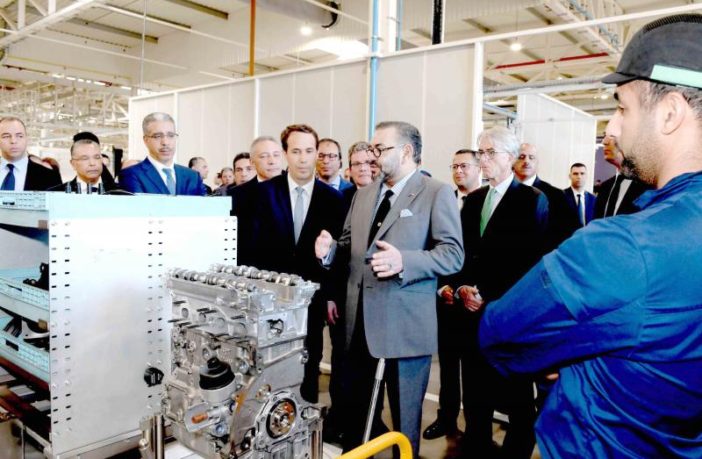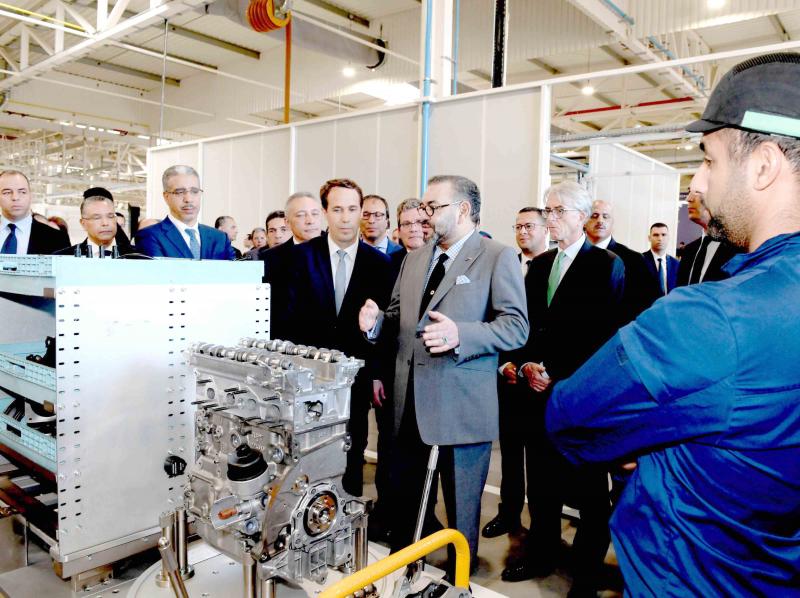Arab Weekly
Last year, Morocco witnessed a 36% increase in foreign investments to reach $3.6 billion, primarily in the finance and automotive sectors.
New momentum. Moroccan King Mohammed VI (C) during the opening of a car assembly line at the Kenitra PSA Car Assembly Plant, June 20. (AFP)
The significant jump in foreign direct investment in Morocco confirms the growing confidence of international corporations in the country’s business climate. Morocco ranked fourth in Africa in their amount in the latest ranking by the UN Conference on Trade and Development (UNCTAD) thanks to last year’s whopping 36% increase over 2017 to reach $3.6 billion, primarily in the finance and automotive sectors.
Data show that the flow of foreign investment to North Africa increased by 7% to reach $14 billion, the largest share of which went to Egypt and Morocco, while Algeria and Tunisia received between $1 billion and $2 billion in investments.
UNCTAD said Morocco continues to benefit from a relatively stable economic performance, in addition to having a diversified economy that is appealing to foreign investment in finance, renewable energy, infrastructure and the automotive industry.
The largest investment made last year in the country was the acquisition of 53% of Saham, Morocco’s largest insurer, for $1 billion by the South African Sanlam Group.
African countries, including Morocco, are increasingly relying on special economic zones, including free zones, with the availability of 237 such areas on the continent providing a special tax environment to attract foreign investment in various value-added industries.
According to UNCTAD, special economic zones represent an important means of export promotion for most countries, especially those of manufactured goods. For Morocco, these zones represent about 60% of the net non-oil exports.
In a new initiative that reflects the solidity of the Moroccan business climate, the Casablanca Financial Pole and the World Financial Centre in Toronto, Canada, signed a partnership agreement to promote sustainable investment opportunities between Canada, Morocco and the rest of Africa.
According to Manal Bernoussi, director of strategy, marketing and communications at Casablanca Finance City, this “agreement will open the door to exploring opportunities for cooperation between North America, Morocco and Africa.” She also noted that this new partnership with the Canadian financial institution would allow Casablanca’s financial pole to reinforce its network of partners and strengthen its international cooperation.
The agreement reflects both Rabat’s interest in the Canadian market and the attractiveness of the African continent to investors from North America. The agreement will provide a platform to promote best practices in green financing and environmentally friendly infrastructure, in addition to sharing knowledge and expertise to accelerate the development of professional, educational and training programmes in finance.
Jennifer Reynolds, president & CEO of Toronto Finance International, said that through cooperation with Casablanca’s financial hub, her company will facilitate the exchange of information and expertise to create new opportunities for enhanced international cooperation. “Africa is one of the fastest growing economic regions in the world and its trade and investment relations with Canada are improving,” said Reynolds during the signing ceremony.
American corporation Keller Williams, a global real estate network, recently announced that it had chosen Morocco as a new centre for its business. The company said it would launch its business from Casablanca after being encouraged by Morocco’s previous ranking on the 2018 Africa Investment Index, issued by the international group Quantum Global Research Lab, as the most attractive destination for business.
In order to ensure the development of the future structure for investments, the Moroccan government has launched the activity of collective real estate agencies, as this type of move has proven effective globally as an investment mechanism.
Moroccan Minister of Economy and Finance Mohamed Benchaaboun said the activity of these agencies will contribute to modernising financing methods and instruments and will help create a dynamic in the financial markets so that the latter can play their role in mobilising savings and using them efficiently in investment.
The agencies operate according to strict rules in terms of governance, supervision and investment, making them modern investment tools of high quality. They also meet the needs of some companies in terms of long-term investment backed by real estate assets based on rental income, as well as providing flexibility in terms of access to various real estate markets.
These agencies are expected to contribute to the development of a sufficient and good supply of leased properties in the areas of trade, services, industry and hotels, as well as mobilising new financial resources for companies and helping them restructure their financial positions.
Nezha Hayat, head of the Moroccan Capital Markets Authority, said the launch of the initiatives is part of a strategy to diversify financial instruments that respond to the needs of investors. These initiatives are “a key backing of real estate financing and constitute an essential stage in implementing the specific vision for developing capital markets in order to effectively contribute to financing the economy,” she said.








